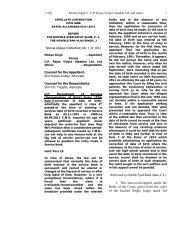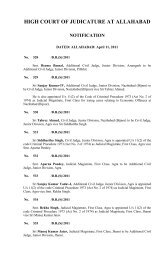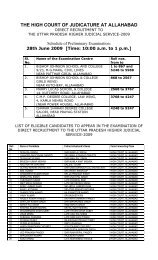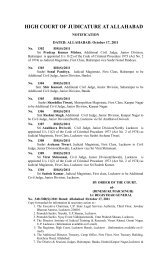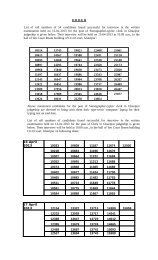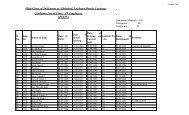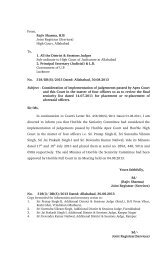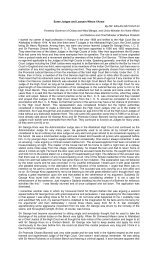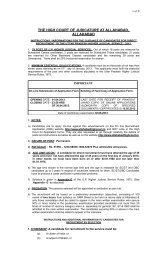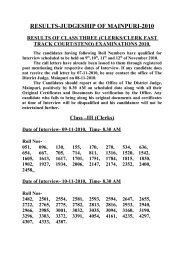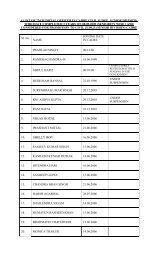Nov - High Court of Judicature at Allahabad
Nov - High Court of Judicature at Allahabad
Nov - High Court of Judicature at Allahabad
Create successful ePaper yourself
Turn your PDF publications into a flip-book with our unique Google optimized e-Paper software.
3 All] Rishikesh Lal Srivastava V.St<strong>at</strong>e <strong>of</strong> U.P. and others 1065<br />
Inspector was necessary before<br />
termin<strong>at</strong>ing services <strong>of</strong> Class-IV<br />
employee then wh<strong>at</strong> was the point in<br />
providing appeal first to the Committee <strong>of</strong><br />
Management and then to the Inspector. In<br />
case the Inspector has already granted<br />
approval for termin<strong>at</strong>ing the service then<br />
can he change his decision in the appeal.<br />
In our opinion the purpose <strong>of</strong> including<br />
two clauses by 1975 notific<strong>at</strong>ion, which<br />
continued with some modific<strong>at</strong>ion by<br />
1978 notific<strong>at</strong>ion, clearly show th<strong>at</strong> the<br />
principal is empowered to termin<strong>at</strong>e the<br />
services <strong>of</strong> the Class-IV employee<br />
without taking any prior approval <strong>of</strong> the<br />
Inspector and his decision is final; it is<br />
subject to an appeal before the Committee<br />
<strong>of</strong> Management then to the appeal before<br />
the Inspector."<br />
50. We have given our thoughtful<br />
consider<strong>at</strong>ion to the aforesaid reasoning<br />
given in the decision <strong>of</strong> Pujari Yadav<br />
(supra) and we find th<strong>at</strong> Regul<strong>at</strong>ion 31<br />
stands qualified by making an express and<br />
separ<strong>at</strong>e provision for the procedure to be<br />
followed in the case <strong>of</strong> Class-IV<br />
employees and, therefore, the word<br />
'employees' occurring in the opening<br />
sentence <strong>of</strong> Regul<strong>at</strong>ion 31 does not<br />
include within its fold, a Class-IV<br />
employee. It is for this reason th<strong>at</strong><br />
Regul<strong>at</strong>ion 31 to th<strong>at</strong> extent stood<br />
excluded in its applicability to Class-IV<br />
employees. To our mind, the Regul<strong>at</strong>ion<br />
making Authority was conscious <strong>of</strong> the<br />
amendments brought about in Regul<strong>at</strong>ion<br />
31 in 1975 and 1978, and it is for the said<br />
reason th<strong>at</strong> the applicability <strong>of</strong> Regul<strong>at</strong>ion<br />
31 to th<strong>at</strong> extent has not been included in<br />
Regul<strong>at</strong>ion 100. The reasoning given in<br />
Pujari Yadav's case (supra) has our firm<br />
approval as we find th<strong>at</strong> the amendments<br />
bring about a sea-change <strong>of</strong> procedure in<br />
rel<strong>at</strong>ion to Class-IV employees with an<br />
exclusive dominant role assigned to the<br />
Head <strong>of</strong> the institution for taking<br />
disciplinary action. These amendments,<br />
which were introduced stepwise, in our<br />
opinion, exclude the role <strong>of</strong> the Inspector<br />
<strong>of</strong> Schools <strong>at</strong> the stage <strong>of</strong> taking action by<br />
the disciplinary authority. The<br />
amendments clearly and unambiguously,<br />
which have been quoted in detail in<br />
Appendix A to the judgment in Pujari<br />
Yadav's case (supra), exhibit the intention<br />
<strong>of</strong> the rule making authority to clothe the<br />
Head <strong>of</strong> the institution with exclusive<br />
powers <strong>of</strong> initial disciplinary control<br />
unfettered by any prior sanction from any<br />
other authority.<br />
51. With pr<strong>of</strong>ound respect, we find<br />
fallacy in the reasoning <strong>of</strong> learned Single<br />
Judge, in the case <strong>of</strong> Daya Shankar<br />
Tewari (supra) as upheld by the Division<br />
Bench in the case <strong>of</strong> Principal, Rashtriya<br />
Inter College (supra) and quoted<br />
hereinabove. The learned Single Judge in<br />
Daya Shankar Tewari's case proceeded on<br />
a consider<strong>at</strong>ion <strong>of</strong> Section 16-G (3) <strong>of</strong> the<br />
Act, and held th<strong>at</strong> the said provision<br />
provides for Conditions <strong>of</strong> Service <strong>of</strong> all<br />
employees including Class-IV employees<br />
as well. According to the learned Single<br />
Judge, Regul<strong>at</strong>ion 31 <strong>of</strong> Chapter III, so<br />
framed would, therefore, apply to a Class-<br />
IV employee and in order to explain the<br />
impact <strong>of</strong> Regul<strong>at</strong>ion 100, held th<strong>at</strong> even<br />
if, Regul<strong>at</strong>ion 31 had not been made<br />
specifically applicable, yet the same was<br />
not c<strong>at</strong>egorically excluded.<br />
52. Apart from the reasons given by<br />
the Division Bench in the case <strong>of</strong> Pujari<br />
Yadav (supra) hereinabove, we may<br />
further add th<strong>at</strong> there is a legal principle<br />
engrained in the maxim "expressum facit<br />
cessare tacitum". The said maxim means<br />
when there is express mention <strong>of</strong> certain




